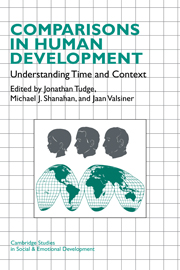Book contents
- Frontmatter
- Contents
- List of Contributors
- Comparisons in Human Development: To Begin a Conversation
- Part One Metatheoretical Approaches to Developmental Comparisons
- Part Two Paradigmatic Statements
- Part Three Comparisons at the Level of Data
- 7 The Co-development of Identity, Agency, and Lived Worlds
- 8 Sociocultural Promotions Constraining Children's Social Activity: Comparisons and Variability in the Development of Friendships
- 9 The Everyday Experiences of North American Preschoolers in Two Cultural Communities: A Cross-disciplinary and Cross-level Analysis
- Part Four Commentaries
- Author Index
- Subject Index
7 - The Co-development of Identity, Agency, and Lived Worlds
Published online by Cambridge University Press: 04 May 2010
- Frontmatter
- Contents
- List of Contributors
- Comparisons in Human Development: To Begin a Conversation
- Part One Metatheoretical Approaches to Developmental Comparisons
- Part Two Paradigmatic Statements
- Part Three Comparisons at the Level of Data
- 7 The Co-development of Identity, Agency, and Lived Worlds
- 8 Sociocultural Promotions Constraining Children's Social Activity: Comparisons and Variability in the Development of Friendships
- 9 The Everyday Experiences of North American Preschoolers in Two Cultural Communities: A Cross-disciplinary and Cross-level Analysis
- Part Four Commentaries
- Author Index
- Subject Index
Summary
Within the discipline of anthropology, the concept of culture has undergone a major revision. The notion of culture as a homogeneous, bounded entity has been replaced by a notion of cultures as heterogeneous and unbounded, contested and emergent. The former perspective, sometimes labeled “objectivist,” has given way to a “practice” view of culture. In the paradigms that predate practice theory, especially structuralism and structural functionalism, the important analyses were those that happened after the culture had been analytically segregated, so to speak, from the flow of daily life. The point was to understand culture as a system, separable and significant unto itself. A whole generation of criticism has led practice theorists to take a different direction. These theorists no longer seek an abstract and generative model of culture, postulated to “underlie” social action. The point instead is to understand collective meaning systems as situated in social action, education and individual development as they occur in practice, and linguistic forms as they are used in performance In the older paradigms, one started with moments of cultural production, episodes of the joint production of conversation, incidents of practice, and episodes of performance only because they were the convenient, observable points of entry to the important objects of study; practice theorists start from and stay with these moments because they are where human life happens. They are the sites where social formations, cultures, mental states, and languages exist.
- Type
- Chapter
- Information
- Comparisons in Human DevelopmentUnderstanding Time and Context, pp. 193 - 221Publisher: Cambridge University PressPrint publication year: 1996
- 3
- Cited by

